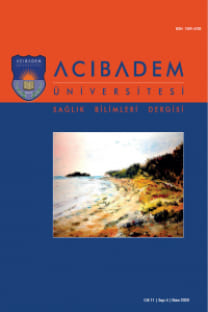Hemşirelik Öğrencilerinin Etik Karar Verme Düzeyleri ve Etkileyen Faktörlerin Belirlenmesi
DETERMINATION THE ETHICAL DECISION MAKING PROCESS LEVELS OF NURSING STUDENTS AND THE FACTORS THAT EFFECT THE
nursing, ethic, decision-making,
___
Alpınar Z. Bir Bilimsel Felsefeci Olarak Yaman Örs’ün Yaklaşımıyla Etik’in Anlamı ve Anlamsızlığı, Ankara: Elif Yayınevi; 2011.Heikkinen A, Lemonidou C, Petsios K, et al. Ethical codes in nursing practice: the viewpoint of Finnish, Greek and Italian nurses. J Adv Nurs 2006;55:310–9. doi: 10.1111/j.1365-2648.2006.03912.x
Berggren I, Bégat I, Severinsson E. Australian clinical nurse supervisors’ ethical decision-making style. Nurs Health Sci 2002;4:15–23.
Tschudin V. Ethics in nursing: the caring relationship, 3rd ed.. London: Elsevier Science Limited; 2003.
Park M, Kjervik D, Crandell J, Oermann MH. The relationship of ethics education to moral sensitivity and moral reasoning skills of nursing students. Nurs Ethics 2012;19:568–80. doi: 10.1177/0969733011433922
Bennett AS. Curricular approaches to teaching ethics in baccalaureate nursing programs. Chester, PA: Widener University; 1997.
Park JH, Kim YS, Kim WO. The present status and future directions of nursing ethics education. Korean Journal of Medical Ethics Education 2009;12:251–60.
Ujvarine AS. Ethics in Hungarian nursing education programs. Nurs Ethics 2008;15:696–7. doi: 10.1177/0969733008092877
Görgülü RS, Dinç L. Ethics in Turkish nursing education programs. Nurs Ethics 2007;14:741–52. doi: 10.1177/0969733007082114
Aydın İ. Eğitim ve Öğretimde Etik, 2. Baskı. İstanbul: Pegem Yayıncılık; 2006.
Winland-Brown JE. A Comparison of student nurses, nurses and non- nurses with regard to their moral judgements on nursing dilemmas. Doctoral Dissertation. Florida: Florida Atlantic University; 1983.
Savage JS, Favret JO. Nursing students’ perceptions of ethical behavior in undergraduate nursing faculty. Nurse Educ Pract 2006;6:47–54. doi: 10.1016/j.nepr.2005.08.002
Scanlon C. A professional code of ethics provides guidance for genetic nursing practice. Nurs Ethics 2000;7:262–8. doi: 10.1177/096973300000700308
Numminen OH, Leino-Kilpi H. Nursing students’ ethical decision- making: a review of the literature. Nurse Educ Today 2007;27:796– 807. doi: 10.1016/j.nedt.2006.10.013
Lee WH, Han SS, Kim YS. The status of nursing ethics education in Korea 3-year and 4-year-college of nursing. Korean Journal of Medical Ethics Education 2001;4:376–87.
Kim YS, Park JW, Son YJ, et al. A longitudinal study on the development of moral judgement in Korean nursing students. Nurs Ethics 2004;11:254–65. doi: 10.1191/0969733004ne693oa
Woods TJ. The Effect of Education on Nursing Resolution of Ethical Dilemmas Among Nurses Practicing in a Rural Area. Doctoral Dissertation. Memphis: Memphis State University; 1993.
Sucu G, Dicle A, Saka O. Hemşirelikte klinik karar verme, etkileyen etmenler ve karar verme modelleri. Hemşirelikte Eğitim ve Araştırma Dergisi 2012;9:52–60.
Crisham P. Moral judgement of nurses in hypothetical and nursing dilemmas. doctoral dissertation. Minnesota: University of Minnesota; 1979.
Cerit B. Hemşirelik Etik İkilem Testi’nin geçerlik-güvenirlik çalışması ve hemşirelerin etik karar verebilme düzeyi. Sağlık Bilimleri Fakültesi Hemşirelik Dergisi 2010;47–67.
Vatan F, Argon G, Engin DM, Binbir H, Çiçek A. Hemşirelerin yönetsel kararlara katılımlarının incelenmesi. Ege Üniversitesi Hemşirelik Fakültesi Dergisi 2012;28:13–24.
Cobanoğlu N, Algier L. A qualitative analysis of ethical problems experienced by physicians and nurses in intensive care units in Turkey. Nurs Ethics 2004;11:444–58. doi: 10.1191/0969733004ne723oa
Lomis KD, Carpenter RO, Miller BM. Moral distress in the third year of medical school; a descriptive review of student case reflections. Am J Surg 2009;197:107–12. doi: 10.1016/j.amjsurg.2008.07.048
Gjerberg E, Fİrde R, Pedersen R, et al. Ethical challenges in the provision of end-of-life care in Norwegian nursing homes. Social Science & Medicine 2010;71:677–84. doi: 10.1016/j. socscimed.2010.03.059
Ham KL. A comparison of ethical reasoning abilities of senior baccalaureate nursing students and experienced nurses. Unpublished doctoral dissertation. Memphis, Tennessee: The University of Memphis; 2002.
Hatfield PG. The relationship between levels of moral/ethical judgement, advocacy and autonomy among community health nurses. Doctoral Dissertation. Michigan: Michigan State University; 1991.
Woods M. Nursing ethics education: are we really delivering the good(s). Nursing Ethics 2005;12:5–18. doi: 10.1191/0969733005ne754oa
Han SS, Kim YS, Park JH, et al. A study of the moral sensitivity of nurses and nursing students in Korea. Korean Journal of Medical Ethics Education 2007;10:117–24.
Yılmaz F, Atay S, Arıkan D. Hemşirelik öğrencilerinin etik karar verebilme düzeyi. Turkiye Klinikleri J Med Ethics, 2013;21:79–87.
Gül Ş, Duru-Aşiret G, Bayrak-Kahraman B, Devrez N, Örnek-Büken N. Etik dersi alan ve almayan hemşirelik öğrencilerinin etik karar verebilme düzeylerinin incelenmesi. Hemşirelik Araştırma Geliştirme Dergisi 2013;1:23–31.
Auvinen J, Suominen T, Leino-Kilpi H, Helkama K. The development of moral judgment during nursing education in Finland. Nurs Educ Today 2004;24:538–46. doi: 10.1016/j.nedt.2004.07.005
Özyer K, Azizoğlu Ö. Demografik değişkenlerin kişilerin etik tutumları üzerindeki etkileri. Ekonomik ve Sosyal Araştırmalar Dergisi 2010;6:59–84.
West T, Ravenscroft S, Shrader, CB. Cheating and moral judgment in the college classroom: a natural experiment. Journal of Business Ethics 2004;54:173–83. doi: 10.1007/s10551-004-9463-x
- ISSN: 1309-470X
- Yayın Aralığı: 4
- Başlangıç: 2010
- Yayıncı: ACIBADEM MEHMET ALİ AYDINLAR ÜNİVERSİTESİ
Doğumu Kolaylaştırıcı Non-Farmakolojik Yöntemlerin Bir Nullipar Gebe Vakasında Uygulanması
Meryem METİNOĞLU, Aylin Yalçın IRMAK, Sinem Albayrak KAYA
Aile Sağlığı Merkezlerinde Çalışan Evli Hemşirelerin İş-Aile Çatışma Düzeyini Etkileyen Faktörler
Selma GÜREL, Süheyla ÖZSOY, Renginar ÖZTÜRK DÖNMEZ
Toplumsal Cinsiyet Eşitsizliği: Kadın Sağlığına Etkisi
Hemşirelik Öğrencilerinin Etik Karar Verme Düzeyleri ve Etkileyen Faktörlerin Belirlenmesi
Sibel KÜÇÜK, Neşe UYSAL, Nazan Çakırer ÇALBAYRAM, İlknur KAHRİMAN, Sabahat ALTUNDAĞ, İlknur GÖNENÇ
Burak BAŞLANGIÇ, Görkem GÜNGÖR, Gökhan AYDIN, Melih ULUER, Mustafa KARADEMİR, Bülent YAPICI, Bilgehan ŞAHİN, Banu ATALAR, Enis ÖZYAR
Türkiye’de Hemşirelik Bakım Algısının İncelenmesi
Emine KOL, Emine GEÇKİL, Cüneyt ARIKAN, Mihrap İLTER, Özge ÖZCAN, Emre ŞAKIRGÜN, Ümmühan DAYAN, Gülzade UYGUN, Duha KILIÇ, Mervenur MACİT, Emine USLULAR, Ayşenur SIZLI, Nesrin ÇAKIR, Dilek SOLAK, Ayşe KAVGACI, Selma SABANCIOĞULLARI, Selma ATAY
Algılanan Stres İle Gastrointestinal Semptom Arasındaki İlişkinin İncelenmesi: Tanımlayıcı Araştırma
